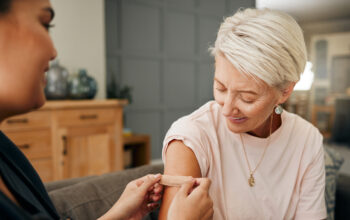Interview – BBC World News – COVID-19 vaccine manufacturers want to reassure the public and send a message to regulators
Interview – BBC World News – COVID-19 vaccine manufacturers want to reassure the public and send a message to regulators
10 September 2020 – By Thomas B. Cueni
Thomas Cueni, IFPMA Director General, spoke to BBC World New programme Outside Source, on 8 September 2020, about the need for rigorous regulatory standards for approval of COVID-19 vaccines.
Ros Atkins: President Trump announces he may have a vaccine as early as October for COVID-19.
Today drug companies have vowed not to bow to political pressure. The chief executives of the world’s biggest drug companies have signed a joint pledge promising to uphold the integrity of the scientific process while developing coronavirus vaccines. The pledge says they will only submit for approval or emergency use authorization after demonstrating safety and efficacy through a Phase 3 clinical study. The statement goes on to say: we believe this pledge will help ensure public confidence in the rigorous scientific and regulatory process by which COVID-19 vaccines are evaluated and among the signatories AstraZeneca and Pfizer who both have candidate vaccines in those Phase 3 trials.
Thomas Cueni is director general of the International Federation of Pharmaceutical Manufacturers and Associations which represents the companies who signed the pledge. He is with us live here on Outside Source. Thank you very much indeed for your time. I just wonder why you felt it necessary to put out this pledge?
Thomas Cueni: I think it’s really important to reassure the public but also send a message to regulators. We all desperately want a vaccine against the coronavirus. However, we want a vaccine which is safe, effective and of high quality. We can’t afford to cut corners. That’s why the message from the vaccine manufacturer CEOs but also the message from all our member companies was important.
Ros Atkins: Is Russia cutting corners?
Thomas Cueni: When you look at the speed with which that vaccine was licensed, I am concerned that some corners were cut. When you look at the pledge which was issued today, everybody agrees that you need Phase 3 clinical trials. This means it can’t be done with just testing a vaccine for safety and efficacy on 50 or so volunteers. We are talking here about clinical trials involving tens of thousands of people. For example, the Pfizer-BioNTech trial, which is far advanced, [it involves] about thirty thousand volunteers. Part of [the volunteers] get the vaccine, part of them get a placebo. You will need to look whether people do still get infected, whether they do get COVID-19 and then you need to check, whether those who get it got the placebo, whether the vaccine works or not. All these things do need time. We are talking about fast development, but you really need to move as fast as possible but at the same time as slow as needed.
Ros Atkins: But Mr Cueni, everyone agrees you need stage 3 clinical trials but the FDA in the US has suggested that perhaps that isn’t necessary, so you’re out of sync with the Americans?
Thomas Cueni: The manufacturers are the ones who are submitting the dossier for approval, and all of them in their pledge today are committed to large scale clinical trials.
Ros Atkins: Are you saying that these huge pharmaceutical manufacturers are essentially saying, the primary authority on this matter in the US is wrong?
Thomas Cueni: When you look at the guidance from the FDA, and that hasn’t changed, everybody expects large clinical trials. What’s also important is that the companies commit to publishing the results of the clinical trials whether they are good or bad. They are committed to full transparency. Just last week, we had a big global media briefing with some of the CEOs who signed the pledge, they said they were also are in favor of an independent external expert advisory committee helping the FDA to reach the right conclusion. Therefore, the message is clear: there is a temptation for politicians to push a vaccine approval faster than might be good for the testing of the quality and safety, and the manufacturers are clear they don’t want that to happen.
Ros Atkins: Could you be clear with me: we heard Donald Trump yesterday saying he thinks a vaccine could be possible by October. That would have raised the expectations of not just Americans, but people all around the world. Is he wrong to suggest that’s possible?
Thomas Cueni: I think it’s challenging. We can expect some results of these large clinical trials maybe by the end of October. But then you still need to look at the data. You still need to validate the data. I think it’s fairly unlikely that we will have a vaccine approved or, in particular distributed in a large scale, before the end of the year. We may be surprised, but clearly the manufacturers do not want speed above quality.
Ros Atkins: Finally can I ask you whether you are certain a vaccine is possible? Because a vaccine of this nature has never been created before. Are we now at the stage in research where we can say this will happen, it’s just a question of when?
Thomas Cueni: I’m personally optimistic. Having discussed this with many of the scientists involved, I believe we will get the vaccine. It is a question about when. It’s also a question, will the vaccine have the same effect on all sorts of population, the young as well as the elderly? Because the early trials have basically been done only on younger populations. And we don’t know yet how long the immunity will last. But I‘m optimistic, we’ll see a vaccine.
Ros Atkins: Thomas Cueni, we appreciate you joining us on Outside Source.
Author






